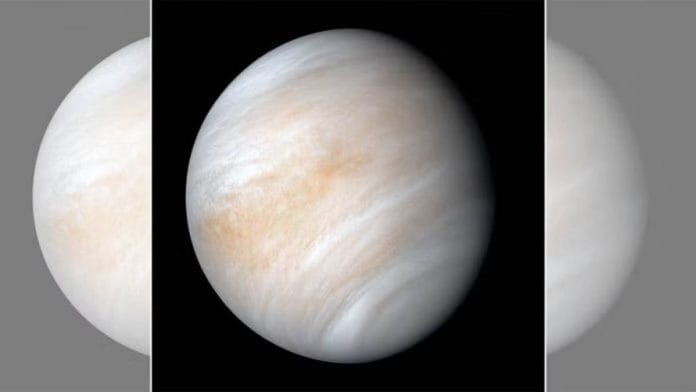New Delhi: The design of the spacecraft and experiments for India’s ambitious Venus Orbiter Mission (VOM) to study Earth’s neighbour is ready, senior officials from the Indian Space Research Organisation (ISRO) confirmed to ThePrint Wednesday, hours after the Union Cabinet approved the mission. They also said that the VOM will likely take flight by March 2028.
Officials said the mission would be a significant stride for India’s space programme, which is now focusing on interplanetary missions.
Senior scientists from the Indian space agency explained that the mission to study Venus is being planned as an orbiter mission, which means that a spacecraft will be placed in the planet’s orbit as it hovers and conducts scientific experiments.
“In this current plan, we do not plan to land a spacecraft on Venus. The spacecraft will be designed to hover over Venus’s atmosphere, from where we will take our measurements and conduct our experiments,” an official from ISRO said.
The mission aims to study the Venusian surface, subsurface, atmospheric processes and the influence of the sun on Venus’s atmosphere.
In a media interaction a few months ago, ISRO chairperson S. Somanath had said the Venus mission had been kept on the backburner as the space agency was focused on lunar missions in the coming years.
The proposal for the Venus mission had been submitted to the government earlier this year and was awaiting clearance. It will now be picked up again.
“The study of the underlying causes of the transformation of Venus, which is believed to be once habitable and quite similar to Earth, would be an invaluable aid in understanding the evolution of the sister planets, both Venus and Earth,” the department of space said in a statement issued after the cabinet meeting Wednesday.
“ISRO will be responsible for developing the spacecraft and its launch. The project will be effectively managed and monitored through the established practices prevailing at ISRO. The data generated from the mission would be disseminated to the scientific community through existing mechanisms,” it added.
According to scientists, Venus, the second planet from the sun in the solar system, has a similar structure and size to Earth. Its thick atmosphere traps heat, making it the hottest planet in the solar system. Below the dense, persistent clouds, the surface has volcanoes and deformed mountains.
Understanding Venus might help scientists understand the Earth better.
Also Read: Satellite launching spree to tie-ups with 60+ countries, why India is scaling up its space diplomacy
Significance of Venus mission
According to officials from ISRO, while India is now confident of conducting interplanetary missions—it landed Chandrayaan-3 near the lunar south pole—a trip to Venus will require new and challenging capabilities. The mission is also expected to provide India with significant and unique findings about the planet.
“This mission will showcase our technology development capabilities and scientific prowess,” the ISRO official said.
The Venus Orbiter Mission has been approved with a total funding of Rs 1,236 crore, of which Rs 824 crore will be spent on the spacecraft. Other costs include the development and realisation of the spacecraft, specific payloads and technology elements, global ground station support costs for navigation and network, and the launch vehicle.
Previous efforts to study Venus
India might have entered the race to study Venus now, but probes worldwide have focused on the Earth’s “twin sister” for years.
US’ National Aeronautics and Space Administration (NASA) flew its MESSENGER spacecraft past Venus twice on its way to Mercury to get hints about the former’s atmosphere.
The European Space Agency’s Venus Express has also studied the planet’s ionosphere and atmosphere. This mission found some important information about the surface of the planet.
Apart from India’s VOM, Rocket Lab and Massachusetts Institute of Technology’s (MIT) Venus Life Finder, NASA’s DAVINCI and VERITAS, ESA’s EnVision are some of the future missions to study Venus.
In May this year, researchers from US’s University of Colorado had released some ground-breaking findings about Venus. Their study looked at how Venus, which is believed to have had as much water as Earth and could have supported life, became dry.
“Earth could one day become Venus. Maybe 10,000 years later, Earth will change its characteristics. Earth was never like this. Long back, it was not a habitable place,” Somanath had said in a media interaction earlier this year.
(Edited by Nida Fatima Siddiqui)






